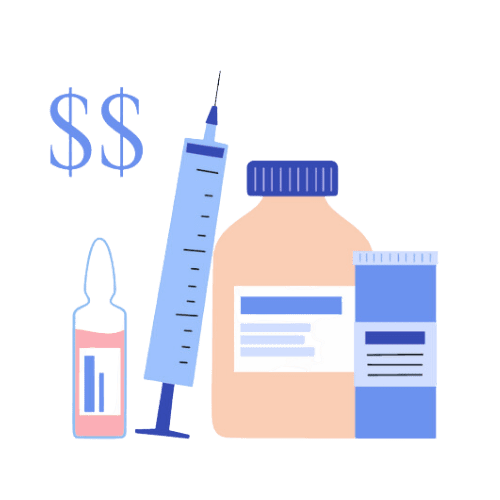Egg Freezing & IVF in the United States
At Zora Health, you are our top priority. We’re here to guide you through every step of your egg freezing or IVF journey — helping you understand your options, and make confident, informed decisions about your care and costs.
Egg freezing, also known as mature oocyte cryopreservation, is a method used to save women’s ability to get pregnant in the future.
In vitro fertilisation (IVF) is a procedure used to help with fertility, prevent genetic problems and assist with the conception of a child

Spread out the cost of treatment over 12, 24, and 36 months to avoid large upfront payments and reduce financial burden.
LEARN MORE
Accessible & affordable fertility care in the United States
Egg Freezing and IVF in the United States
Do you know that a third of all Americans either have had fertility treatments or know someone who's had one? This is most probably because fertility clinics in the United States (US) include a vast array of treatments including in vitro fertilisation (IVF), egg freezing, egg donation, embryo freezing, gestational surrogacy, intracytoplasmic sperm injection (ICSI), intrauterine insemination (IUI), and gender selection.
American fertility doctors conduct advanced preimplantation genetic diagnosis and screening and blood testing for immunological diseases so that preventive treatment can be started. They also work closely with licensed and accredited sperm banks and agencies to find good candidates for gestational surrogacy.
Medical Travel in the United States
The US enjoys a reputation for having advanced healthcare technology in both public and private facilities. A report published in the National Healthcare Quality and Disparities Report found that there was overall improvement in the quality of healthcare. However, a study by the Milbank Quarterly reported that only about half of patients receive recommended care. Although patient-care quality varies from state to state, the good news is that there are still facilities that meet professional standards.
There is no universal health insurance coverage for Americans, making healthcare very expensive. Aside from having their employers buy their health insurance or buying it themselves, pharmaceutical drugs cost twice as much in the country compared to other developed countries.
Soak up the rich American culture that sets the bar for the whole world
The country has a unique multicultural history, due to immigrants coming from all over the world. Religious freedom has resulted in almost all religions being practised, although 70% of Americans practise Christianity.
The US is the world leader in making movies and television shows. Select USA says that it dominates a third of the worldwide industry of media and entertainment. Besides that, Broadway is found in New York. American music is also diverse and it includes hip-hop, jazz, rhythm and blues, country and western, and rock. America is also at the forefront of sports, especially basketball, football, and baseball.
The area that attracts the most visitors is Times Square in New York, which is filled with vibrant shops, restaurants, and billboards. The Union Station is not an ordinary train station but it is also filled with shops, a movie theatre, a food court, and restaurants. Among the five Disney destinations in the US, it is Orlando, Florida's Magic Kingdom, Walt Disney World that is the most frequented.
There is widespread news about drug-induced crimes, mass shootings, and hate crimes happening in the US in recent years. Don't let that prevent you from visiting though because there is no evidence that perpetrators target tourists more. Just stay on guard for petty thefts and find out more about the climate conditions of your destinations. Avoid sellers who offer their wares from the trunk of their vehicles to avoid getting scammed. Alcohol is prohibited for people who are under 21 years old.
When travelling, take the Amtrak trains and double-decker Superliner trains if you want to see the majestic views outside. If you are on a budget, take a long-distance bus to get you from one city to another. Flying domestically is the best choice if you're hitting different regions. The country is very accommodating to people with disabilities because public modes of transportation are wheelchair-friendly. The subways are a popular mode of travel in major cities like New York, Chicago, and Los Angeles.
Abortion bans have sparked national worry about having IVF treatments
According to an article in Pew Research Centre, 33% of Americans have had or knew someone who's had used any form of fertility treatment. That comprises a third of Americans, which signifies positive social attitudes towards fertility treatment. However, extreme anti-abortion activists condemn IVF. Steve Aden of Americans for Life likens IVF to "eugenics" while the St Joseph County Right to Life organisation claims that discarding excess embryos created during IVF is essentially abortion and should be criminalised.
Jim Baxa of West Texans for Life considers disposing of non-viable embryos "murder" and wants Texas’s laws to prescribe that doctors only create a few embryos and implant all of them, which would greatly reduce the success and increase the risks of IVF treatment. To counter this movement, Barbara Collura, president of the national infertility association Resolve, proposed a solution. She says that a bill has to be passed by lawmakers to protect access to IVF in America.
The most commonly used language in the US is English and the other languages spoken are Spanish, Chinese (Mandarin, Cantonese, and other varieties), Tagalog, Vietnamese, French, and French Creole or Louisiana Creole French.
Benefits of Doing Fertility Treatments in the United States
Fertility services in the United States offer a wide range of treatments including IVF, egg freezing, egg donation, gestational surrogacy, intracytoplasmic sperm injection (ICSI), intrauterine insemination (IUI), and gender selection. They have advanced preimplantation genetic diagnosis and screening (PGD/S) of eggs and embryos. They also test for immunological disorders and treat them accordingly. Additionally, many work with licensed and accredited, reliable sperm banks and agencies that find gestational surrogates, and fertility testing.
An article on the KFF website reports that despite this wide variety of available fertility services, it is still way outside the reach of typical Americans in terms of cost. There are very few public and private insurance companies that cover fertility services. Some states have started to require private insurance providers to cover it but the coverage is still significantly limited. As for public coverage, there is only one state Medicaid program that covers it but there is no Medicaid program that covers in-vitro fertilisation. Very few publicly funded clinics offer basic infertility services.
Private medical centres take fertility treatments seriously. They offer personalised treatment plans and patient care teams including a doctor (usually a certified specialist), patient guide, clinical coordinator, nurse, and medical assistant. IVF and andrology labs are certified by the Clinical Laboratory Improvement Amendments Board (CLIA).
The Advanced Fertility Centre of Chicago has one of the best egg donation programs in the US with a live birth rate per transfer of 75.7% for fresh donor eggs in 2017 (exceeding the 50.7% national average) and no waiting lists. In New York, Shady Grove Fertility Centre provides a "Shared Risk 100% Refund Program" for IVF or donor eggs. Qualifying patients must meet the criteria for several factors including age and the state of their ovarian, sperm, or uterine functioning.
Costs to Consider
According to a report from Reproductive Rights, the average total cost of IVF in the US is USD 19,200 per standard cycle. This does not include additional costs such as diagnostics, genetic testing, donor eggs/sperm and storage fees. In most cases, patients must prepare themselves for additional cycles because there is only a 35% chance of having a live birth rate as a result of their first IVF cycle. This applies to young women under 35 using their own oocytes, according to 2016 data from the Society for Assisted Reproductive Technology.
Generally, egg freezing costs USD 7,000 up to 20,000 plus USD 200 up to 1200 per year for storage.
Insurance
According to an article published by Women's Health Policy, 17 states mandate insurance companies to cover infertility diagnosis and treatment. However, only 11 of these require coverage for IVF treatment and exemptions apply to certain employers. Insurance does not generally cover elective egg freezing. In some states, insurance must cover egg freezing for medical reasons. However, it is unclear whether this applies to transgender individuals whose gender-affirming care can lead to infertility. Surrogacy costs are also generally not covered by insurance.
The few insurance companies that cover infertility treatment require a clinical infertility diagnosis. Single people and same-sex couples may be required to undergo IUI which costs between USD 150 and 4,000 per cycle (plus additional costs) to receive this diagnosis. To qualify for coverage in Arkansas, Hawaii, and Texas, couples must use their own egg and sperm during IVF. Certain grants and financing options are only available to married couples.
In New York, group insurance providers must cover diagnostic tests. Large group insurance providers must cover up to three cycles of IVF and fertility preservation for medical reasons. If an insurance plan covers prescription drugs, it must also cover medications for fertility diagnosis and treatment. However, individual, small group and self-insured markets are exempt. The New York State Infertility Insurance Mandate prohibits discrimination based on age, sex, sexual orientation, marital status, or gender identity.
In Los Angeles, egg freezing for cancer patients is covered by insurance as of 2019. However, IVF is currently not covered by insurance. The proposed SB 729 Bill would reduce the financial burden of fertility treatment for same-sex couples as they would be eligible for treatment covered by insurance.
In Chicago, the Illinois Insurance Code expanded the definition of infertility in 2022 to include single and LGBTQ+ people ensuring that they have equal access to infertility treatment insurance coverage. Illinois-based insurance plans must cover diagnosis and treatment if they are group insurance plans providing coverage for over 25 employees but not if they are group plans with 25 or fewer employees, individual plans, or Medicaid.
Other Considerations Before Starting Your Fertility Treatment in the United States
IVF
The American Society for Reproductive Medicine (ASRM) mandates that gay and lesbian couples and transgender individuals be treated equally to cis heterosexual married couples.The Affordable Care Act (ACA) prevents healthcare discrimination based on sex. However, the Trump Administration has since removed protections meaning that LGBTQ+ patients may be denied healthcare.Since Roe vs. Wade was overturned in the US, there have been no changes in state laws regarding IVF treatment. However, experts predict that anti-abortion laws like those in Louisiana could massively restrict IVF, making it illegal for clinics to freeze or dispose of embryos.Fertility options are available for LGBTQ+ individuals and single parents such as third-party IVF (surrogate and egg or sperm donor) for gay and lesbian couples, reciprocal IVF (one partner provides eggs and the other carries the pregnancy) which is available for lesbian and trans male couples, and split egg retrieval (half fertilised with each partner’s sperm) for gay and trans female couples.
Egg Freezing
There is no age limit for egg freezing or restrictions on the length of storage.International patients may have to undergo extra health screenings, depending on the fertility clinic.
Surrogacy
There are no federal surrogacy laws; restrictions vary from state to state.Some states outlaw compensation for surrogates. Others limit money given to a surrogate to cover pregnancy-related expenses. Traditional surrogacy (where the surrogate uses her own egg fertilised by the sperm of the intended father or donor) is outlawed in many states.
Donors
Gamete donation is largely unregulated in federal law.Donated gametes must be tested for communicable diseases but not genetic diseases. Sperm banks are not legally required to verify the donor’s medical and personal history.Sperm banks usually set their own limits on how many times a donor can donate.Why Choose the United States for Your Fertility Treatment
There are many perks when choosing the United States for your fertility treatment. Private fertility clinics offer personalised treatment plans and often have fertility experts on board. IVF and andrology labs are certified by the Clinical Laboratory Improvement Amendments Board (CLIA). Most clinics have egg donor programs and high success rates.
To save money, many also offer financial programs that include refunds for eligible candidates. Fertility options are also widely available to the LGBTQ+ community as well as unwed parents. A bonus to having your procedures done in the US is the chance to soak up its rich culture by watching Broadway shows and visiting world-famous tourist spots such as Times Square, the Union Station, and Disney's Magic Kingdom.
Ready to do your egg freezing & IVF journey in the US?
Meet Our Network of
Experienced Fertility Specialists

You deserve the very best.
That's why we’re here to support you — whenever you need it.
1
Personalised Care Navigation
Expert guidance to choose the right care provider and navigate the process, costs, & regulations.
2
Seamless, All-in-One Care
Consultations, diagnostics, telehealth, education, & treatment referrals are available on one platform.
3
Trusted, Reliable Resources
Gain clarity & confidence with verified information. Save time, reduce stress, & eliminate endless research.
Global reach, unparalleled service

"Clear pricing - clarity & support from start to end."
"I love Zora Health for their simple, transparent pricing. It was a relief not to worry about unexpected fees or hidden costs. They made the entire process stress-free and easy to understand, which allowed my husband and I to focus on what mattered most - my family's future."
Syarifah, 27 & Indra, 29

"I couldn't believe that I can choose my own doctor and enjoy extra benefits for the same price."
"I had a preferred doctor overseas that my girl friends recommended. He is part of Zora’s clinic network, but I was interested in Zora’s support and perks. After speaking to Zora, they assured me I wouldn’t pay extra. Zora managed the whole process - from personalised guidance to answering my queries about legalities."
Nina, 32, Single

"The financing options lifted a huge weight off my shoulders."
"Zora’s instalment plans were a true lifesaver. I was so grateful for their flexible and affordable options. I have been thinking about preserving my eggs as a form of “insurance” but didn’t want to pay a big lump sum upfront as I am saving for a house. The instalment plan helps me manage my finances better.”
Elaine, 32

"I never felt alone in my fertility journey."
"After failing previously, we were very anxious and were not sure what to expect. They guided us through the process and cared for us every step of the way. My treatment at the clinic was long, and sometimes it was emotionally draining, but having a fertility coach made us feel better and more prepared. As busy professionals, we appreciate the convenience of scheduling appointments through Zora. I have recommended Zora to all our friends."










